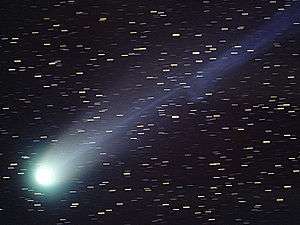130P/McNaught–Hughes
| Discovery | |
|---|---|
| Discovered by |
Robert H. McNaught Shaun M. Hughes |
| Discovery date | September 30, 1991[1] |
| Alternative designations | 1991 IX; 1997 H1 |
| Orbital characteristics A | |
| Epoch |
2011-Jun-28[1] (JD 2455740.5) |
| Aphelion | 4.9743 AU (Q) |
| Perihelion | 2.0980 AU (q) |
| Semi-major axis | 3.5362 AU (a) |
| Eccentricity | 0.40669 |
| Orbital period | 6.65 yr |
| Inclination | 7.3073° |
| Last perihelion |
June 24, 2011[1] October 23, 2004 February 23, 1998 |
| Next perihelion | 2018-Jan-21[2][3] |
130P/McNaught–Hughes is a periodic comet in the Solar System. It takes 6.65 years to orbit the Sun and is 4.2 km in diameter.[1]
References
- 1 2 3 4 "JPL Small-Body Database Browser: 130P/McNaught-Hughes" (2011-06-13 last obs). Jet Propulsion Laboratory. Retrieved 2011-06-28.
- ↑ Rocher, Patrick (2012-01-15). "Note number : 0150 P/McNaught-Hughes : 130P". Institut de mécanique céleste et de calcul des éphémérides. Retrieved 2012-02-18.
- ↑ Horizons output. "Observer Table for Comet 130P/McNaught-Hughes". Retrieved 2011-06-13. (Observer Location:@sun)
External links
- Orbital simulation from JPL (Java) / Horizons Ephemeris
- 130P at Kronk's Cometography
- 130P/McNaught-Hughes – Seiichi Yoshida @ aerith.net
- Lightcurve (Artyom Novichonok)
| Numbered comets | ||
|---|---|---|
| Previous 129P/Shoemaker–Levy |
130P/McNaught–Hughes | Next 131P/Mueller |
This article is issued from Wikipedia - version of the 3/29/2016. The text is available under the Creative Commons Attribution/Share Alike but additional terms may apply for the media files.

